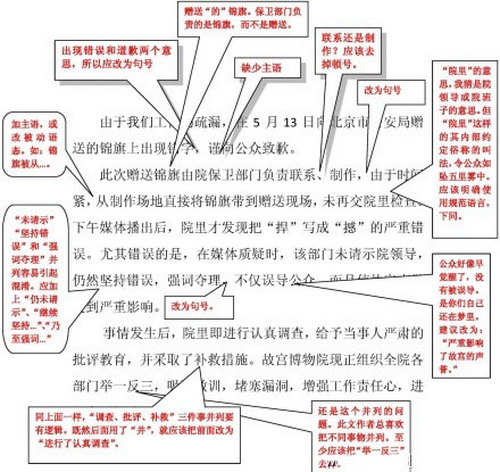The Forbidden Drama: Excuses and Suspicions

Above: Mistakes in an apology letter issued by the Forbidden City management office posted online
Never ruin an apology with an excuse. Well, it appears that the Beijing Palace Museum (also known as the Forbidden City) management has recently ruined not just an apology, but also its credibility.
The imperial palace has endured a spate of bad publicity of late. First, a break-in by an amateur thief, who escaped with precious exhibits by scaling the wall, notwithstanding the fact that the palace is installed with some 1,600 antitheft devices, 400 security cameras and 240 security personnel.
Later, the management invited criticism by using the wrong word to thank the Beijing city police, who nabbed the thief in three days. And then, news broke that a section of the
museum – the Palace of Established Happiness (Jianfu Gong) - had been turned into an exclusive clubhouse for the super-rich, enraging the public further.
The management has since come under public "assault" over security breach, its apology for using the wrong word, and its explanation on the super-rich club. The public has
accused the management of giving excuses and shifting blame.
The wrong word was printed on a banner presented to the police in appreciation of their efficiency. Instead of saying to "defend" (捍 ) the great strength and wealth of
motherland, a homonym that means to "shake" (撼) was used. Both words are pronounced hàn, but imply almost the the opposite meaning.
Before long, the internet was buzzing with jokes about the use of "han," as Chinese netizens questioned the standards of literacy of the officials at the Palace Museum.
When the management office issued an apology, saying the banner was designed by the security department, and no official had examined it due to there not being enough time, it led to yet more derision.
Chinese netizens took upon themselves to "correct" the grammar mistakes in the 260-word apology note, and accused the officials of being insincere and seeking to blame others.
"After such controversy, you would have thought that the officials would be especially careful about the phrasing in order to produce a flawless apology note," noted a commentator on one of China's largest online forums, Tianya. Another user observered, "at this rate, the Forbidden City officials will have to keep on issuing one apology after another."
As for the super-rich club controversy, the management named a private entity - The Beijing Forbidden City Cultural Development Company - for the "wrongdoing", saying the company issued "membership sigh-up forms" without permission, and had been told to stop.
The Legal Evening News, a Beijing daily newspaper, reported that business registration information revealed the company is involved in a variety of business ventures including restaurants serving up imperial-style cuisine, furniture and also researches and promotes imperial and folk cultural products.
One micro blog post summed up the three-fold scandal ironically: "The private company sold memberships without official approval; the security department printed the banner
without official approval; and the thief also stole without official approval!"
The public annoyance over excuses from the officials aside, the whole controversy also highlighted the lack of trust in official statements, a deep rooted opposition to the extremes of bureaucratic redtape and nepotism, as well as increasing resentment against the rich driven by the country's widening wealth gap.
When commenting on the grammar and spelling blunders, many Chinese netizens have questioned how the government came to appoint "illiterate" officials to head such a prestigious cultural heritage site as the Palace Museum.
They also questioned how a private company was vetted before being awarded the right to make money from the "cultural development" at the imperial palace.
In both cases, the netizens have insinuated that office appointment and business deals are dished out based on guanxi (personal connections) and zou hou men (which literally
translates as going through the back door).
As for making money from cultural heritage sites, the practice has been in place for decades. Today, the Forbidden City is a top tourist destination, besides charging various entrance fees, it also rents out space for private businesses to hold functions.
The walled imperial city used to be a symbol of absolute power, and beyond the reach of commoners. After the fall of feudal system, it was eventually turned into a museum and the public were allowed access, since then many have visited the palace and hardly anyone has questioned the commercialization of the former center of power.
However, when rumors circulated that a section of the palace had been designated as an exclusive area reserved for the wealthy, the news touched a raw nerve among people who identify themselves as ordinary and feel apart from a newly emergent class of rich and powerful individuals.
Links and Sources
Tianya: 故宫道歉信又现错误!故宫还能不能找着一个文化人?
KDNet: 送别字锦旗,用病句道歉,故宫文化何在?
Image: Corrections to apology letter
The views posted here belong to the commentor, and are not representative of the Economic Observer |
Interactive
Multimedia

- EEO.COM.CN The Economic Observer Online
- Bldg 7A, Xinghua Dongli, Dongcheng District
- Beijing 100013
- Phone: +86 (10) 6420 9024
- Copyright The Economic Observer Online 2001-2011
















